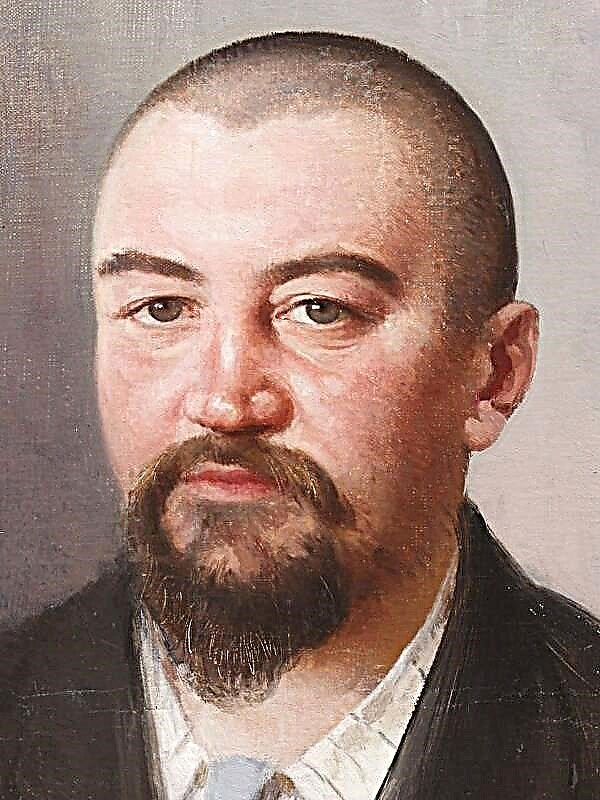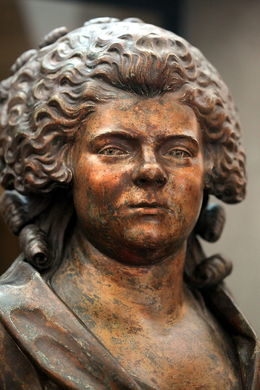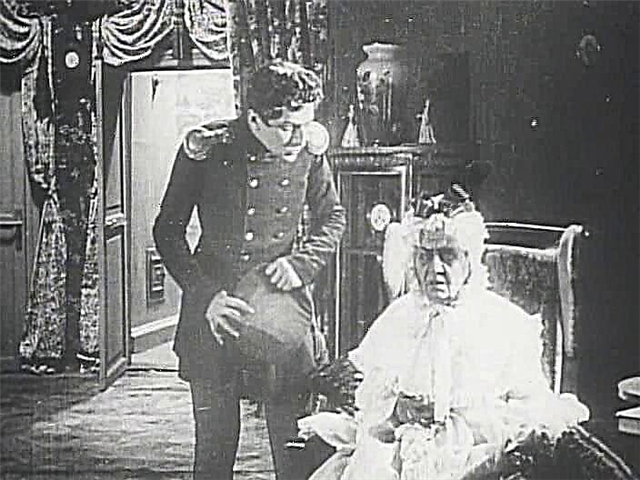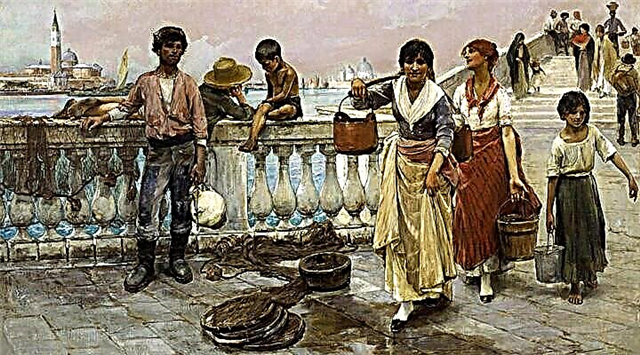The publisher warns the reader that this book was written not so much for entertainment as for edifying purpose.
The author promises to tell without fancy several love stories that happened to people who cannot be called heroes, because they do not command armies, do not destroy states, but are just ordinary Parisian bourgeois who walk slowly in their life's journey.
On one of the big holidays, donations in the church on Mober Square were collected by young Javotta. Donation collection is a touchstone that accurately determines the beauty of the girl and the strength of love of her fans. The one who sacrificed the most was considered the most in love, and the girl who collected the largest amount was the most beautiful. Nicodemus at first sight fell in love with Javotta. Although she was the daughter of an attorney, and Nicodemus was a lawyer, he began to look after her as is customary in secular society. A diligent reader of Cyrus and Clelia, Nicodemus tried to be like their heroes. But when he asked Zhavotga to honor him and allow her to become her servant, the girl replied that she does without servants and knows how to do everything herself. She answered Nicodem’s exquisite compliments with such innocence that she put the gentleman at a standstill. In order to get to know Zhavotga better, Nicodemus made friends with her father Volishon, but that was of little use: when he appeared, the modest Zhavotta either retired to another room or remained silent, constrained by the presence of her mother, who did not leave her step. In order to be able to speak freely with the girl, Nicodemus had to declare his desire to marry. After studying the inventory of movable and immovable property of Nicodemus, Volishon agreed to conclude a contract and made an announcement in the church.
Many readers will become indignant: the novel is somehow scanty, completely without intrigue, the author begins right from the wedding, meanwhile, it should be played only at the end of the tenth volume. But if readers have even a drop of patience, they will wait for the path, for, "as they say, much can happen along the way from a glass to his mouth." The author would have nothing to do so that in this place the heroine of the novel was kidnapped and subsequently kidnapped as many times as the author wants to write volumes, but since the author promised not a ceremonial performance, but a true story, he directly admits that marriage this was prevented by an official protest announced on behalf of a certain person named Lucretia, who claimed that she had a written promise from Nicodemus to marry her.
The story of a young city woman Lucretia
The daughter of the speaker of the judicial board, she was orphaned early and remained in the care of her aunt, the wife of a middle-aged lawyer. Lucrezia’s aunt was an inveterate cardgirl, and every day guests gathered in the house who came not so much for the sake of a card game, but for the sake of a beautiful girl. Lucretia’s dowry was invested in some dubious business, but she nonetheless refused the solicitors and wanted to marry at least the auditor of the Accounts Chamber or the state treasurer, believing that such a husband corresponded to the size of her dowry according to the marriage tariff. The author notifies the reader that modern marriage is a combination of one amount of money with another, and even gives a table of suitable parties to help people entering into marriage. Once in the church, Lucretius saw a young marquis. She fascinated him at first sight, and he began to look for an opportunity to reduce her acquaintance. He was lucky: driving in a carriage along the street where Lucretia lived, he saw her on the doorstep of the house: she was waiting for late guests. The Marquis opened the door and leaned out of the carriage to bow and try to start a conversation, but then a horse rushed down the street, having covered both the Marquise and Lucretius with mud. The girl invited the marquise to the house to clean or wait until they bring him fresh linen and clothes. The bourgeoisie from among the guests began to mock the Marquis, mistaking him for the unlucky provincial, but he answered them so wittily that he aroused the interest of Lucretia. She allowed him to be in their house, and he appeared the very next day. Unfortunately, Lucretius didn’t have a confidante, and the Marquis had a squire: it was usually for them that the heroes of the novels retell their secret conversations. But lovers always say the same thing, and if readers open Amadis, Cyrus or Astrea, they will immediately find everything there that they need. The Marquis captivated Lucretia not only with a good appearance and secular treatment, but also with wealth. However, she succumbed to his harassment only after he made a formal promise to marry her. Since the connection with the Marquis was a secret, fans continued to besiege Lucretia. Among the fans was Nicodemus. Once (this happened shortly before meeting with Javotta), Nicodemus, in a frenzy, also gave Lucretia a written promise to marry her. Lucretia did not intend to marry Nicodemus, but still retained the document. On occasion, she boasted of it to a neighbor, public attorney Wilflatten. Therefore, when Volishon informed Wilflatten that he was marrying his daughter for Nicodemus, he unbeknownst to Lucretia declared a protest on her behalf. By this time, the Marquis had already managed to abandon Lucretia, having stolen his marital obligation before this. Lucretia was expecting a baby from the Marquis, and she had to get married before her position became noticeable. She reasoned that if she won the case, she would get her husband, and if she lost, she would be able to declare that she did not approve of the trial that Wilflatten started without her knowledge.
Upon learning of the protest of Lucretia, Nicodemus decided to pay off her and offered her two thousand ecu so that the case would be immediately dismissed. Lucrezia's uncle, who was her guardian, signed the agreement without even informing her niece. Nicodemus hastened to Javotte, but after being convicted of profligacy, her parents had already decided to pass her off as Nicodemus and managed to find her a richer and more reliable groom - the boring and mean Jean Bedou. Cousin Bedou - Laurent - introduced Bedou to Javotte, and the girl liked the old bachelor so much that he wrote her a pompous love message that the simple-minded Javotte gave to her father without printing. Laurent introduced Javotte to one of the fashion circles in Paris. The mistress of the house where society was gathering was especially highly educated, but she hid her knowledge as something shameful. Her cousin was her complete opposite and tried to flaunt her scholarship. The writer Sharosel (an anagram of Charles Sorel) complained that the publishers stubbornly did not want to publish his works, it does not help even that he holds a carriage, which immediately shows a good writer. Filalet read his Tale of the Lost Amur. Pancras fell in love with Javotta at first sight, and when she said that she would like to learn to speak as fluently as other young ladies, he sent her five volumes of Astrea, after reading which Javotta felt a fiery love for Pancras. She resolutely refused Nicodemus, which pleased her parents very much, but when it came to signing a marriage contract with Jean Bedou, she left the daughter's obedience and flatly refused to pick up a pen. Angry parents sent the obstinate daughter to the monastery, and Jean Bedou was soon comforted and thanked God for having delivered him from the horns that would inevitably threaten him in case of marriage to Javotte. Thanks to generous donations, Pancras visited her beloved in the monastery every day; she devoted the rest of the time to reading novels. After reading all the love affairs, Javotta got bored. Since her parents were ready to pick her up from the monastery only if she agreed to marry Bedu (they did not know that he had already decided to marry), Javotta accepted Pancras' proposal to take her away.
Lucretia became very pious and retired to the monastery, where she met and made friends with Javotta. When it came time for her to give birth, she notified her friends that she needed privacy and asked her not to disturb, and she, having left the monastery and freed herself from the burden, moved to another monastery, known for the strictness of the charter. There she met Laurence, who was visiting a nun friend. Laurent decided that Lucretia would be a good wife to her cousin, and Bedou, who, after a failure with the windy Javotta, decided to marry a girl taken directly from the monastery, married Lucretia. Readers will learn about whether they lived happily or unhappily in a marriage if it came to fashion to describe the life of married women.
At the beginning of the second book, in an appeal to the reader, the author warns that this book is not a continuation of the first and there is no connection between them. This is a series of small adventures and incidents, as for the connection between them, the author provides the bookbinder with care for it. The reader should forget that he has a novel, and read the book as separate stories about all kinds of everyday incidents.
History of Sharosel, Colantina and Belatra
Sharosel did not want to be called a writer and wanted to be considered a nobleman and only, although his father was just a lawyer. Speaking and jealous, Charosel did not tolerate other people's fame, and every new work created by others hurt him, so life in France, where there are many bright minds, was a torture for him. In his youth, some success fell on him, but as soon as he turned to more serious works, his books stopped being sold and, except for the proofreader, no one read them. If the author wrote the novel in accordance with all the rules, it would be difficult for him to come up with adventures for his hero, who never knew love and devoted his whole life to hate. The longest was his romance with a girl who had the same evil temper as his. It was the daughter of a bailiff named Colantine. They met in court, where Colantina led several lawsuits simultaneously. Having come to visit Colantina, Sharosel tried to read to her some of his works, but she talked incessantly about her lawsuits, not letting him insert a word. They parted very pleased that they annoyed each other in order. The stubborn Sharosel decided to make Colantine listen to at least some of his writings at all costs and regularly visited her. Once, Sharosel and Colantina had a fight because Colantina did not want to consider him a nobleman. Colantina got less, but she screamed louder and, rubbing her hands with graphite and not sticking a few plasters, achieved monetary compensation and an order to arrest Sharosel. Frightened, Sharosel took refuge in the country house of one of his friends, where he began to write satire on Colantina and the entire female sex. Charosel made acquaintance with a certain Chatelet attorney, who opened a case against Colantine and secured the cancellation of the previous court order. The successful outcome of the case for Sharosel not only didn’t restore Colantina against him, but even exalted him in her eyes, for she decided to marry only the one who defeated her in a judicial duel, just as Atlanta decided to give her love to the one who would defeat her on the run. So, after the process, the friendship of Sharosel and Colantina became even closer, but here Sharosel had a rival - the third hookmaker, ignorant Belatr, with whom Colantina waged an endless lawsuit. Confessing his love to Colantine, Belatra said that he was fulfilling the gospel law, which tells a person to love his enemies. He threatened to institute criminal prosecution against the eyes of Colantine, who destroyed him and stole his heart, and promised to get a guilty verdict for them with personal arrest and compensation for protests and losses. Belatra's speeches were much nicer to Colantine than the rantings of Sharosel. Inspired by success, Belatre sent Colantine a love letter, teeming with legal terms. Her respect for Belatra increased, and she considered him worthy of even more fierce persecution. During one of their skirmishes, the secretary of Belatra came in, bringing him a signature listing the property of the late Mythophilact (under this name the Führer brought himself out). Everyone became interested in the inventory, and the secretary Volateran began to read. After listing the pathetic furniture and the testator’s orders, a catalog of Mythophilact books followed, among which was The Universal French Somber, Poetry Dictionary and Encyclopedia of Initiations in four volumes, the table of contents of which, as well as the quotation of various types of praises, were read aloud. Belatra made an offer to Colantine, but the need to end the lawsuit with him became an obstacle to marriage. Charosel also asked for the hands of Colantina and received consent. It is difficult to say what prompted him to take this step. He probably married in spite of himself. The young only did what they scolded: even during the wedding feast there were several scenes that vividly resembled the battle of the centaurs with the lapiths. Colantine demanded a divorce and started a lawsuit with Sharosel. "They have always been judged, are judging now, and will be judged as many years as the Lord God will be pleased to let them go."












